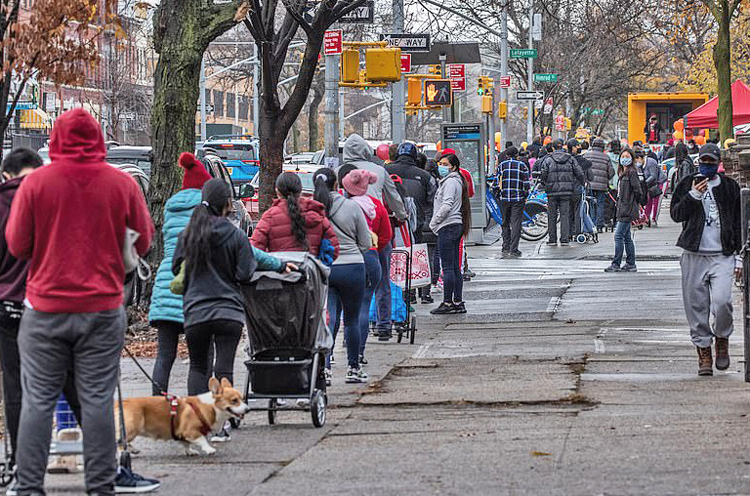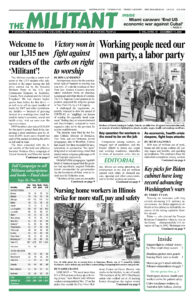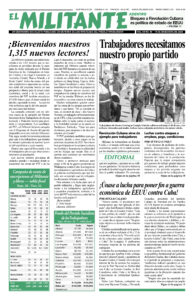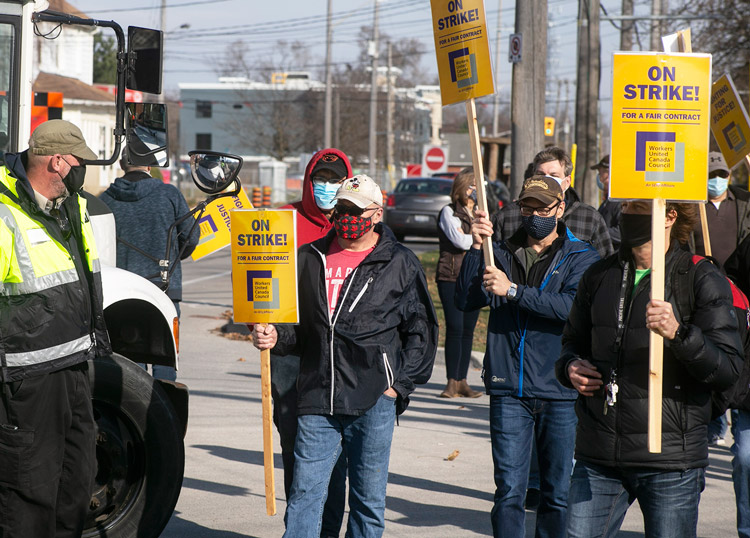With tens of millions out of work, bosses are still laying workers off, cutting wages and benefits, and speeding up production. The employers hope the intensified competition among workers for jobs will create better conditions to deepen these attacks and allow them to shore up their profits on the backs of working people.
But workers are finding ways to stand up to the bosses’ assaults. Some 700 workers are on strike at 11 nursing homes owned by Infinity Healthcare in Illinois. Nurses held a one-day strike Dec. 1 in Albany, New York. Dozens of other strikes for better wages and conditions, including access to protection from coronavirus, have taken place over the last several months.
Alma Bonilla, one of the striking workers at an Infinity nursing center in Chicago, told the Militant that prior to their strike one supervisor told workers, “Go ahead and strike. There’s 35,000 people who want your job.”
The biggest division working people face is between those with a job and those without. Some 20.5 million people are collecting some form of unemployment benefits.
This is just the tip of the iceberg. Millions who were laid off in January or earlier have already exhausted all government jobless pay. Despite an eviction moratorium imposed by the federal Centers for Disease Control and Prevention, thousands have already been evicted. That moratorium expires Dec. 31 at the same time that all the special pandemic payouts run out, unless Congress extends them.
The official unemployment rate of 6.9% excludes millions of part-time workers who want to work full time, and those considered “discouraged” or “marginally attached” because they did not actively look for work over the last month. When they’re included the unemployment rate is 12.1%.
According to the Bureau of Labor Statistics, bosses added 638,000 jobs in October, including 84,000 in construction, 63,000 in warehousing, 109,000 temporary workers and 226,000 restaurant and hotel jobs. But as new government pandemic lockdowns are imposed, many of these jobs will go up in smoke.
One big winner in today’s crisis are the bosses at Amazon. They’re hiring an average of 1,400 a day worldwide, seeking to cash in on profits from soaring online sales. At the same time, governments have let thousands of stores and other small businesses go to the wall.
Amazon reports a 53% rise in profits this year. Also rising are on-the-job injuries at their warehouses, as bosses use automation to drive workers to work faster to maximize the turnover of goods during the holiday shopping season.
Walmart bosses posted a 45% rise in profits, but only increased wages 63 cents an hour on average since March. More workers in different industries face a widening gap between take home pay and rising prices of basic necessities.
Delta Air Lines announced Nov. 25 that it got the pilots union to agree to a 5% cut in their guaranteed monthly work hours, in exchange for a “promise” to not furlough more pilots before 2022. Delta has already cut ground workers’ hours and monthly pay by 25%. More bosses will follow Delta’s example.
Health care crisis
Combined with bosses’ efforts to put the burden of the economic crisis on the backs of workers and farmers, is the disastrous response to COVID-19 by government at all levels and health industry bosses. They have done next to nothing to ensure adequate treatment is available for all those who are ill with COVID-19, 10 months after the pandemic began.
In many hospitals, personal protective equipment is still in short supply. The American Society of Health-System Pharmacists says that that 29 of 40 drugs that are critical for treating coronavirus patients face shortages.
National Public Radio reported Nov. 25 that some hospitals are so overwhelmed they are “rationing care,” a euphemism for denying adequate attention to some patients on the bottom of the triage list. Providing political cover to hospital bosses in Colorado, Gov. Jared Polis issued an executive order Nov. 23 allowing them to turn patients away. Hospital bosses are also increasing the number of patients per nurse, who are already overloaded. In Tennessee authorities have built two field hospitals but they worry there won’t be enough medical workers to staff them.
The Socialist Workers Party’s action platform raises demands that workers and our unions need to fight for today to get workers back to the one place where we can organize together to change the conditions we face — at work.
Job is a basic right of workers
This includes fighting for a government-financed public works program to put the unemployed to work at union-scale wages building and repairing infrastructure to improve the lives of millions. Instead of bosses closing hospitals not “profitable” enough, workers can be put to work building more medical centers, including in rural areas. Our unions need to fight for unemployment pay for all those out of work — both U.S.- and foreign-born — as long as they need it.
The SWP platform explains that when bosses threaten more layoffs, we should fight for a cut in the workweek without any cut in our weekly take-home pay.
Some of the industries hardest hit by layoffs have been restaurants and hotels, where many of the workers are women. And “remote” schooling has forced many women to quit jobs or cut their hours to stay home with their children.

Many workers are getting by only with the help of area food banks. Pictures in newspapers across the country showed tens of thousands of families waiting in long lines to get a turkey for Thanksgiving.
The Island Harvest Food Bank and Harry Chapin Regional Food Bank on Long Island in New York reported they had requests for 26,000 turkeys, 6,000 chickens and other food, many by people who’ve never been to a food bank before.
In New York City, hundreds of workers protested demanding the city issue more street vendor permits so they can make a living without fear of fines and police harassment. Hundreds of mostly immigrant food delivery workers also marched for improved conditions.
A Nov. 30 article in the New York Times described the conditions bosses inflict on delivery workers, from restaurants refusing to let them use the bathrooms to app companies ripping off tips. Several of those interviewed bought bicycles to work for app-based companies after losing restaurant and construction jobs because of the pandemic.
Fighting for amnesty for all workers without papers — which would eliminate the threat of deportation — would put immigrant and U.S.-born workers in the best position to join together to fight for unions, better wages and working conditions for all workers and strengthen the working class as a whole.


